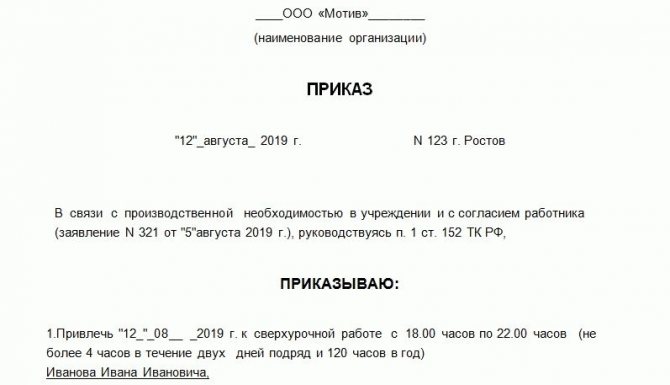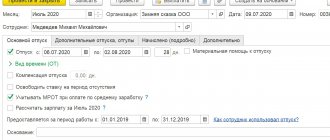According to the labor legislation of the Russian Federation, any work must be paid. Working overtime is no exception. An employer may involve an employee in overtime work only with the latter’s consent, with the exception of certain situations provided for by labor legislation. If an employer refuses to pay overtime work, the employee has the right to file a complaint against him with the regulatory authorities or go to court. But first, you can try to resolve the issue peacefully by submitting an application to the manager for overtime payment. In this article we will look at how to draw up such a statement, and also provide a sample of it.
Overtime
Additional working hours according to Art. 99 of the Labor Code of the Russian Federation represent time spent on work at the initiative of the employer, or beyond the work period established in the company. If the initiative for such work comes from the employee himself, additional hours of work are not considered overtime. Based on Art. 91 Labor Code of the Russian Federation and Art. 99 of the Labor Code of the Russian Federation, a 40-hour work week is considered normal work time, and additional work hours should not be more than 4 hours in 2 days and 120 hours in a year. In addition, certain categories of workers should be taken into account, for whom the working hours are set below:
| Categories of workers | Working hours |
| Minor workers | 24 to 35 hours |
| Disabled people of groups 1 and 2 | Up to 35 hours |
| Workers whose working conditions are classified as hazard levels 3 and 4 | Up to 36 hours |
| Women working in the Far North | Up to 36 hours |
| Medical staff | Up to 39 hours |
For the specified categories of employees, additional hours of work will be considered hours exceeding the established limits (
What is recycling?
First, let’s look at what does not belong to the concept of “recycling” to avoid confusion. According to Article 97 of the Labor Code of the Russian Federation, there are two types of labor organization: irregular working hours and overtime work. If an employee carries out his activities according to the first scheme, the concept of processing will not apply to him. This rule is also set out in a letter from Rostrud dated June 7, 2008. That is, if an employee with irregular working hours is late in the evening, he is not entitled to any additional payments for this. Compensation for overtime is provided by additional vacation days.
Another case when work beyond the schedule is not paid additionally: the employee decided, on his own initiative, to stay in the office in order to complete tasks that were not completed on time. This is relevant if a worker is given a task and adequate deadlines to complete it, but he does not have time. The lack of compensation in this case is regulated by a letter from Rostrud dated March 18, 2008.
In what cases can employees be required to work overtime?
As noted above, all work that employees perform in excess of the norm in a shift is overtime. Employees can be involved in such work in the following cases:
- if emergency or emergency situations arise that affect the work of the company;
- if emergency or emergency situations have arisen that affect the interests of a wider range of people;
- if the employer decides that overtime work is necessary.
Any overtime work must be limited in time. So, on the basis of Art. 99 of the Labor Code of the Russian Federation, overtime work should not exceed 4 hours within 2 days and 120 hours in total per year. In this case, it will not matter for what reason workers are called to work overtime.
Important! An employee can be engaged to work overtime only after obtaining his consent. Exceptions are emergency situations (99 Labor Code of the Russian Federation).
Who can write a memo?
This can do:
This clause of the employment contract is one of the fundamental ones, so good reasons are needed to change it. Each side has their own.
There are two options when an employer has the right to change working hours:
- with the consent of the employee. It is necessary to formulate an additional agreement to the employment contract, and then issue an order to change the work schedule;
- unilaterally. It is necessary to notify the subordinate in writing 2 months before the expected time of change of schedule.
On what grounds does a boss have the right to demand a change in a subordinate’s work schedule:
- organizational reasons: preparation of the company for liquidation, its reorganization, the occurrence of financial difficulties, reduction or expansion of staff, etc.;
- technological: modernization of equipment, automated production process, introduction of various innovations, etc.
The notice should indicate:
- The reason for changing the employee’s working hours;
- The rights and obligations that the employee has during the period of validity of the notice;
- The time by which the employee needs to make a decision;
- What will happen if the employee agrees or refuses to continue working in the company under the new conditions provided.
An employee may request a change in schedule due to one of the following circumstances::
- If you are a parent (guardian or trustee) of a child under 14 years of age;
- If you are a parent (guardian or trustee) of a disabled child under 18 years of age;
- If you need to care for seriously ill family members;
- The presence of certain diseases;
- Pregnancy;
- Changing of the living place.
Each stated fact must be supported by relevant evidence.
Documents required for registration of overtime work
When inviting an employee to work overtime, the employer must draw up the appropriate documents. However, there is no single form for such documents. In each specific situation, this document can be developed by the employer individually. This document should include the following:
- the reason for working above the established norm;
- the date of involvement in overtime work, as well as the duration of such work;
- the right to refuse to work beyond the norm;
- consent to perform overtime tasks;
- payment for additional hours of work.
To attract employees to work overtime, it is possible to prepare 3 types of documents:
- Leader's order. This document is official and is drawn up in free form . The order must contain the following:
- reasons for overtime work;
- date, duration of such work;
- list of persons involved in overtime work (including their positions);
- documents confirming employees’ consent to work overtime;
- amount of surcharge and form of compensation;
- signatures of workers.
The employee, having read the order and signed it, is obliged to perform the prescribed work. Otherwise, a penalty may be issued against him in the amount provided for by labor legislation.
- Service note. As an alternative to the order, a memo may be issued. It is used, as a rule, in those departments that keep a log of working hours. All the same information as in the order is indicated in the memo.
- Notification. An alternative to a memo is a notice that briefly outlines the employee's approval for a particular type of work. The employee must sign the notice. After that, he performs the specified work and the number of hours he worked is indicated on the notification. Then the document is certified by the manager.
Components of an order
Expert opinion
Musikhin Viktor Stanislavovich
Lawyer with 10 years of experience. Specialization: civil law. Member of the Bar Association.
The document consists of a header, introductory, main and final parts. At the top of the page the name of the organization, place of publication, order number and date of signing must be indicated.
Then comes the motivation. Most often, the vague and general goal of “production necessity” is indicated, but there are also more specific options for the purpose of issuing an order.
For example:
- To continue work if the replacement employee fails to show up.
- If the bulk of the work could not be completed according to the technical conditions, and if they are not completed, damage to the property of the employer or the state will follow (this situation is discussed in detail in the first paragraph of Article 99 of the Labor Code of the Russian Federation).
- If failure to perform the prescribed work may pose a risk to human life.
- If this is temporary equipment repair work.
- To prevent a disaster.
- Due to the need to troubleshoot problems in electricity, gas supply and other utilities systems.

When formulating the motives that should motivate a manager, it is better to quote the Labor Code. The goals should not go beyond its scope, otherwise the employee will have the right to bring his employer to administrative responsibility for non-compliance with the law and Labor legislation in particular.
Application for overtime pay
Important! Submitting an application drawn up by the employee himself will allow him to have a certain guarantee in the event of litigation.
Depending on what specific rules are established within the company, the employee can draw up an application by hand or fill out a form developed by the employer. The required information in the application shall include the following:
- Full name, employee position;
- the reason for overtime work, the date of work, as well as its duration;
- consent to additional work;
- date, employee signature.
All applications from employees must be kept in the personnel department
Sample application
When an application for overtime work is not required
The employee’s consent to work overtime is not required in the following cases:
- If the work is related to the prevention of disasters, industrial accidents, or to eliminate the consequences of these accidents and natural disasters.
- During socially important work related to the elimination of unforeseen circumstances that disrupt the operation of water, gas supply, heating, lighting, communications and other systems.
- For work that is necessary due to the introduction of a state of emergency or martial law.
- During urgent work resulting from an emergency, as well as other situations that threaten the life and normal living conditions of the population.
Important! In other situations, it is necessary to obtain consent from the employee to work overtime.
Employee risks
Both the employer and the employee should remember that in the event of litigation, officially certified documents will be required. Otherwise, neither one nor the other side will be able to prove that they are right. In the absence of supporting documents, employees may be left without overtime pay at all. Therefore, the employee will need to draw up an application in two copies, one of which will be kept by the employer, and the second, with a mark from management, will remain in the hands of the employee. In addition to the application, it would also be useful to have another supporting document, for example, an order, memo or notice.
Grounds for issuing an order
Overtime work involves some kind of emergency. This is not an ordinary case. The first thing the employer must do before issuing an order is to document this state of affairs. He can do this with the help of a special memo, report, report on the commission of an incident.
The work that must be done may not be completed due to technical reasons. One of these documents will explain the current circumstances. Only after this is it necessary to take the employee’s written consent and issue an order.
It is a mistake to believe that you can immediately stipulate consent to “overtime” in your employment contract. The employee agrees only to perform specific duties at a specific time, and does not surrender to slavery.
Thus, the correct actions of the employer will be:
- Edition of the basis.
- Drawing up written consent of the employee.
- Issuance of an order on overtime work with reference to the two previous documents.
1.1. Yes, of course you can submit such an application in accordance with the Labor Code of the Russian Federation.
2.1. the labor inspectorate can identify a violation, issue an order and hold an official or legal entity accountable.
To recover wages, you need to go to the district court. At the same time, I note that you can do this at your place of residence.
I can help you prepare a statement of claim remotely, and in court you can represent your interests yourself.
3.1. - Hello, get ready for court. And in 3 months. Because the statute of limitations is 3 months. Best wishes.
5.1. Yes, of course you can, but only within three months from the date of violation of your right (day of payment).
5.2. You can if you have documents confirming that you work overtime.
6.1. Art.
152 Labor Code of the Russian Federation. Overtime work is paid for the first two hours of work at least one and a half times the rate, for subsequent hours - at least twice the rate.
Specific amounts of payment for overtime work may be determined by a collective agreement, local regulations or an employment contract. At the request of the employee, overtime work, instead of increased pay, can be compensated by providing additional rest time, but not less than the time worked overtime.
7.1. You have every right not to rewrite.
8.1. Contact a lawyer in your city in person.
10.1. Yes, it is considered valid if it indicates who is terminating the contract and with whom by agreement.
11.1. “At the beginning of each year they force you to write an application for part-time work up to 1.5 times the rate”
“There is also no additional payment for increasing the volume.”
I advise you to file a complaint with the labor inspectorate regarding this matter.
12.1. Yes, you can count on payment for overtime.
Expert opinion
Musikhin Viktor Stanislavovich
Lawyer with 10 years of experience. Specialization: civil law. Member of the Bar Association.
12.2. If three months have passed since the dismissal, it will be difficult to obtain payments through the court, since the period has expired. But you can try to restore the missed deadline. If you need help, please contact us.
13.2. Drawing up a statement of claim is a paid service. If there is a need, please contact us.
13.3. Drawing up statements of claim is a paid service; this is specified in the site rules.
14.1. Prove that you only learned about this circumstance now. After all, Article 392 of the Labor Code states when he found out or should have known.
15.1. 1) Article 392. Time limits for applying to court for resolution of an individual labor dispute
An employee has the right to go to court to resolve an individual labor dispute within three months from the day he learned or should have learned about a violation of his rights, and in disputes about dismissal - within one month from the date he was given a copy of the dismissal order or the day of issue of the work book.
2) a deadline missed for a GOOD reason may be restored by the court. The validity of the reasons is assessed by the COURT.
16.1. if these payments are included in the remuneration system provided for in your organization by the regulations on remuneration, then they are included, but if not, then, accordingly, they are not included in the calculation of average earnings.
Art. 139 Labor Code To calculate the average salary, all types of payments provided for by the remuneration system that are used by the relevant employer are taken into account, regardless of the sources of these payments.
According to the labor legislation of the Russian Federation, any work must be paid. Working overtime is no exception.
An employer may involve an employee in overtime work only with the latter’s consent, with the exception of certain situations provided for by labor legislation. If an employer refuses to pay overtime work, the employee has the right to file a complaint against him with the regulatory authorities or go to court.
But first, you can try to resolve the issue peacefully by submitting an application to the manager for overtime payment. In this article we will look at how to draw up such a statement, and also provide a sample of it.






